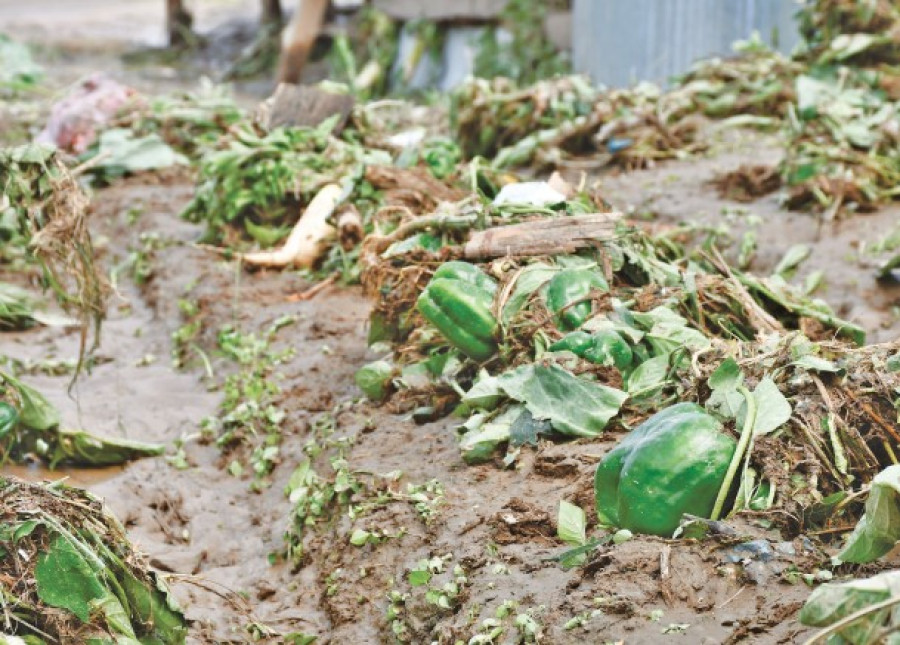Money
Floods, landslides push veggie prices to new highs
Most retail prices crossed Rs100 per kg in two days. Prices may rise again with large areas inundated, and landslides affecting the supply chain.
Post Report
The vegetable supply chain to Kathmandu Valley has been disrupted by the inundation of large areas of standing crops in the current wave of floods and landslides across the country, pushing prices to new highs in the last two days.
The torrential rains, which started on Friday, have killed 14 people and affected thousands of households, according to the authorities. Most of the highways have been affected by landslides. A vast swathe of agricultural land has been inundated.
According to the Kalimati Fruits and Vegetable Market Development Board, tomatoes, potatoes, cabbage, cauliflower, eggplant, cow pea (long), French bean, soybean green, bitter gourd, bottle gourd, pointed gourd, snake gourd, smooth gourd, squash, okra, and leafy vegetables are currently among the most expensive kitchen ingredients in the Valley.
Traders say the prices, which were already expensive, increased overnight.
Retail prices of most vegetables have crossed Rs100 per kg within two days, said Shanta Adhikari, owner of Shanta Tarkari Pasal in Balkot. “I was buying tomatoes for Rs1,000 per crate (23 kg) till Friday. Today [Sunday], the price nearly doubled to Rs1,900 per crate.”
Adhikari said the tomato retail price was hovering around Rs70–75 per kg until Friday and has now reached Rs100 per kg. As the Bhaktapur area has been flooded and inundated, the price of leafy vegetables has reached Rs100 per kg, from Rs70 per kg three days ago.
The wholesale price of tomato big (Nepali) at the Kalimati market, the country’s largest fruits and vegetable wholesale venue, has increased by 26.67 percent to Rs95 per kg. Similarly, the price of tomatoes (local) has increased by 211.26 percent to Rs55 per kg, while the price of tomato small (tunnel) has risen by 186.72 percent to Rs65 per kg.
Traders at Kalimati said that the wholesale price of all seasonal vegetables has risen as the rainfall has inundated crop fields and affected road transport.
Adhikari said French beans, which she sold at Rs60-80 per kg on Friday, now cost Rs100 per kg.
Similarly, smooth gourd, which she sold at Rs70-75 per kg, now costs Rs100, and cauliflower has reached Rs120 per kg. Capsicum, too, has become expensive. It costs Rs140 per kg.
“Even the eggplant, which cost Rs50 per kg, has hit Rs80-85 per kg,” she said.
The wholesale price of all three varieties of potatoes—red, Indian, and Mude—at the Kalimati market has increased within a week. The price of potato red has increased by 2.18 percent to Rs62.33 per kg, potato red (India) by 10.32 percent to Rs57 per kg, and potato red (Mude) by 3.92 percent to Rs53 per kg.
The wholesale price of cabbage has sharply increased by 62.63 percent to Rs45 per kg, eggplant long by 57.14 percent to Rs55 per kg, and eggplant round by 36.36 percent to Rs75 per kg.
The long cowpea price has increased by 44.44 percent to Rs65 per kg, the French bean by 76.92 percent to Rs115 per kg, and the French bean (rajma) by 27.27 percent to Rs140 per kg in wholesale.
Seasonal soybean green wholesale price has increased by 26.32 percent to Rs120 per kg.
The wholesale price of bitter gourd has sharply increased by 111.11 percent to Rs95 per kg, while the price of bottle gourd has risen by 66.67 percent to Rs75 per kg.
The wholesale price of pointed gourds has increased by 28.57 percent to Rs45 per kg, snake gourds by 22.22 percent to Rs55 per kg, and smooth gourds by 36.36 percent to Rs75 per kg.
The wholesale price of squash has increased by 36.36 percent to Rs75 per kg, and the price of okra has also gone up by 36.36 percent to Rs75 per kg.
Seasonal cucumber (local) wholesale price has increased by 68.42 percent to Rs160 per kg.
“The constant rainfall has hit vegetables ready to be shipped to the market. So it is predictable that the prices will go higher in the coming days,” said Binay Shrestha, information officer at the Kalimati Fruits and Vegetable Market Board.
Shrestha said the supply of fresh vegetables in Kathmandu has also slowed down. “Our market received 600–650 tonnes of vegetables daily during this time, but we are receiving hardly 500 tonnes now.”
Adhikari said she has been selling stale vegetables because she has not received sufficient fresh supplies.
Currently, the Kalimati market receives seasonal vegetables from the districts neighbouring Kathmandu Valley such as Makawanpur, Dhading, and Kavre, besides a few districts from the Tarai like Chitwan and Sarlahi.
“Despite being kitchen essentials, when prices cross Rs100 per kg, people tend to buy vegetables less,” Adhikari said. “As a result, business in the shops and market also slows down.”




 14.12°C Kathmandu
14.12°C Kathmandu












